School Improvement
Our Director of Education is: Jo Galloway
jo.galloway@libertytrust.org.uk
The Liberty School Improvement Model is made up of five key elements:
- Establishing sufficient school improvement capacity;
- Forensic analysis of school improvement needs;
- Supporting and developing leadership;
- Providing access to effective practice and expertise; and
- Monitoring improvements in outcomes and reviewing provision.
The improvement strategy we undertake has to be responsive to the needs of our individual academies, rooted in the evidence from the classrooms of each. Our school improvement model explains how we identify what needs to be done, who supports this improvement and what key indicators we use to articulate success (Carter, 2020, pp. 29-30). As Sir David Carter asserts, an effective school improvement strategy develops and improves the workforce, builds succession and enables the strongest teachers and leaders to influence outcomes for more children (DfE, 2016, p. 5).
How we Categorise our Schools
In his four-stage model of school improvement, Sir David Carter acknowledges that every school is different and operates in different circumstances (DfE, 2016, p.28); however, it is important to ensure that the development of a school improvement model provides clarity for all – both in terms of expectations of academies, as well as in confirming the type and frequency of support available from the Trust as a whole.
At Liberty, we have adopted the four-stage model of school improvement in order to establish the foundations of support for all academies at all phases; leaders know that at different points of an academy’s journey they will either need or offer capacity and strength.
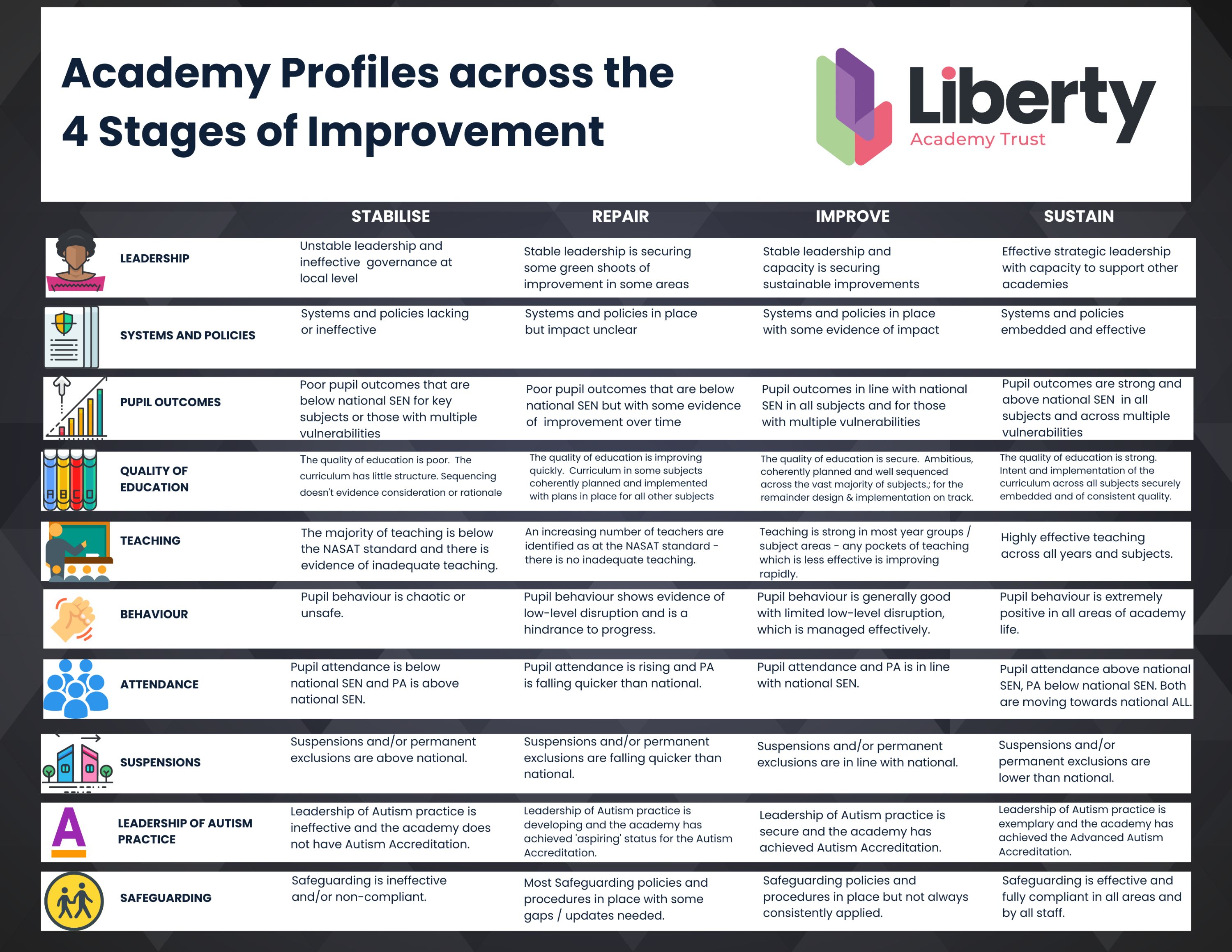
What Does a Highly Effective Liberty Academy Look Like?
A highly effective Liberty academy is underpinned by the following key building blocks, which when successfully achieved guarantee a quality of educational experience to be proud of.
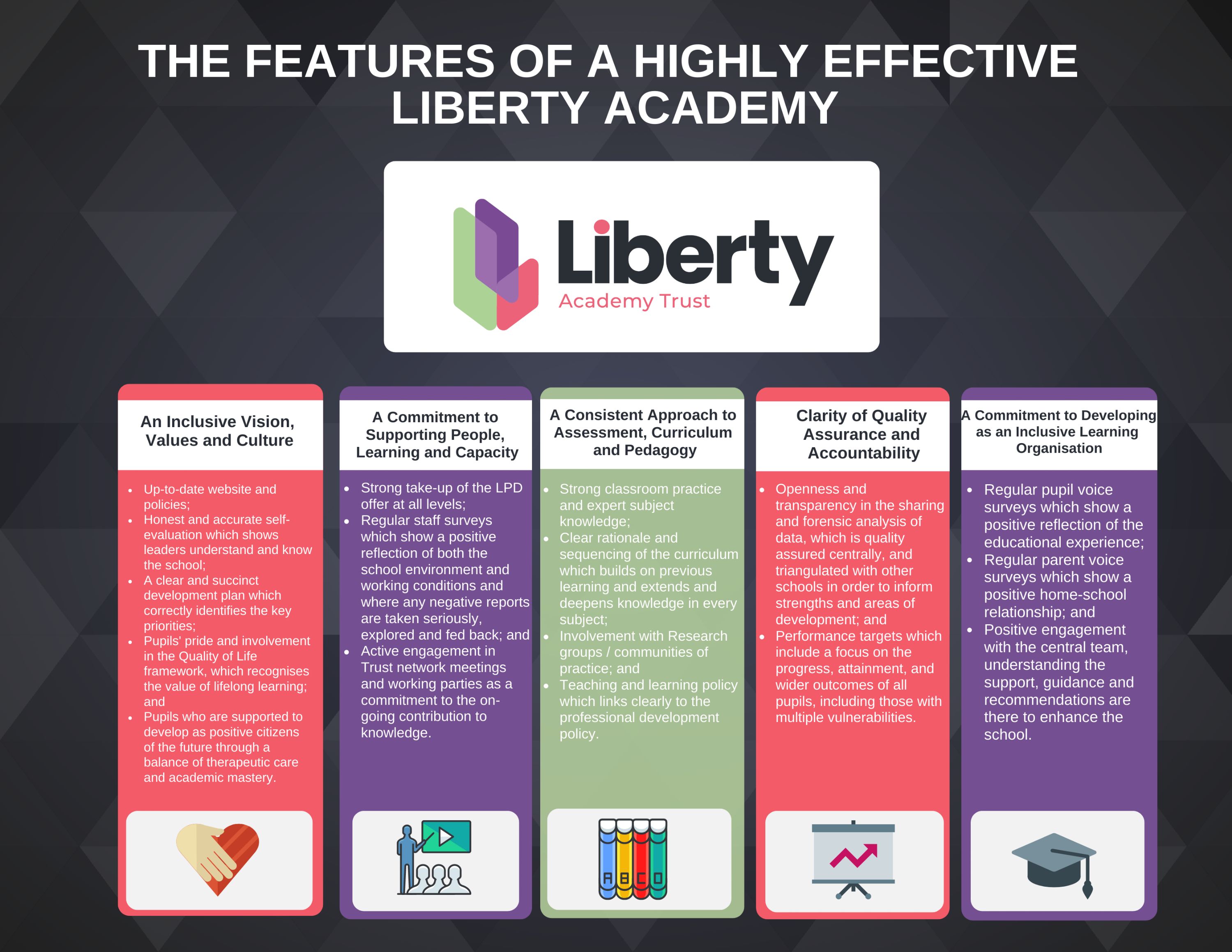
An Inclusive Vision, Values, Strategy and Culture
An effective Liberty academy upholds an inclusive vision that recognises all pupils as valued members of the school community. The mission to create a world that works for autistic individuals begins with all staff understanding their role in bringing out the best in all children and with this understanding a culture of tolerance and diversity is promoted.
An inclusive vision, values, strategy and culture will be evidenced in the following ways:
- Up-to-date website and policies;
- Honest and accurate Self-Evaluation which shows leaders understand and know the academy;
- A clear and succinct Development Plan which correctly identifies the key priorities;
- Pupils’ pride and involvement in the Quality of Life Framework, which recognises the value of lifelong learning; and
- Pupils who are supported to develop as positive citizens of the future, through a balance of therapeutic care and academic mastery.

A Commitment to Supporting People, Learning and Capacity
An effective Liberty academy ensures all staff have access and commitment to continued professional development which recognises the individual and collective value and contribution to be made. Attention is given to developing the talent from within and succession planning is a strategic focus. Staff well-being is prioritised and seen as an integral part of continued school improvement.
A commitment to supporting people, learning and capacity will be evidenced in the following ways:
- Strong take-up of the learning and professional development offer at all levels;
- Regular staff surveys which show a positive reflection of both the school environment and working conditions and where any negative reports are taken seriously, explored and fed back; and
- Active engagement in Trust network meetings and working parties as a commitment to the ongoing contribution to knowledge.
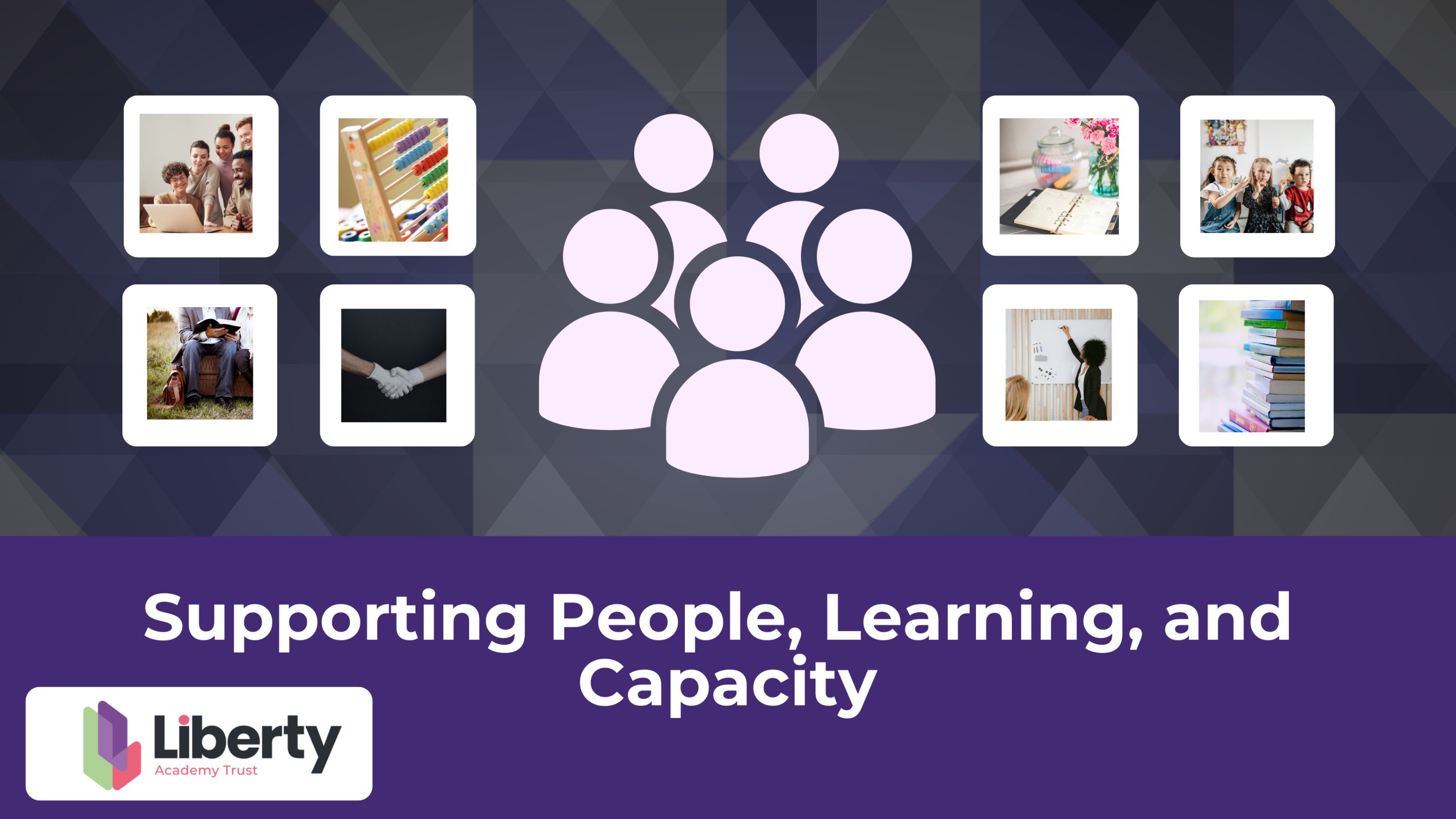
A Consistent Approach to Assessment, Curriculum and Pedagogy
An effective Liberty academy requires all teaching and instructional staff to be actively engaged in discussions on pedagogy and regularly reflecting on their own practice so that all pupils, regardless of prior attainment or vulnerabilities are able to access the learning opportunities in every subject, be challenged in their thinking and understand new knowledge. Teaching and instructional staff are passionate about their subject and excited about sharing this in formal lessons and beyond.
A consistent approach to assessment, curriculum and pedagogy will be evidenced in the following ways:
- Strong classroom practice and expert subject knowledge;
- Clear rationale and sequencing of the curriculum which builds on previous learning and extends and deepens knowledge in every subject;
- Involvement with Research groups / networks / communities of practice
- Autism Lead practitioners in each school working with central team colleagues to refine pedagogical approaches that accelerate learning for autistic pupils; and
- Teaching and learning policy which links clearly to the professional development policy.
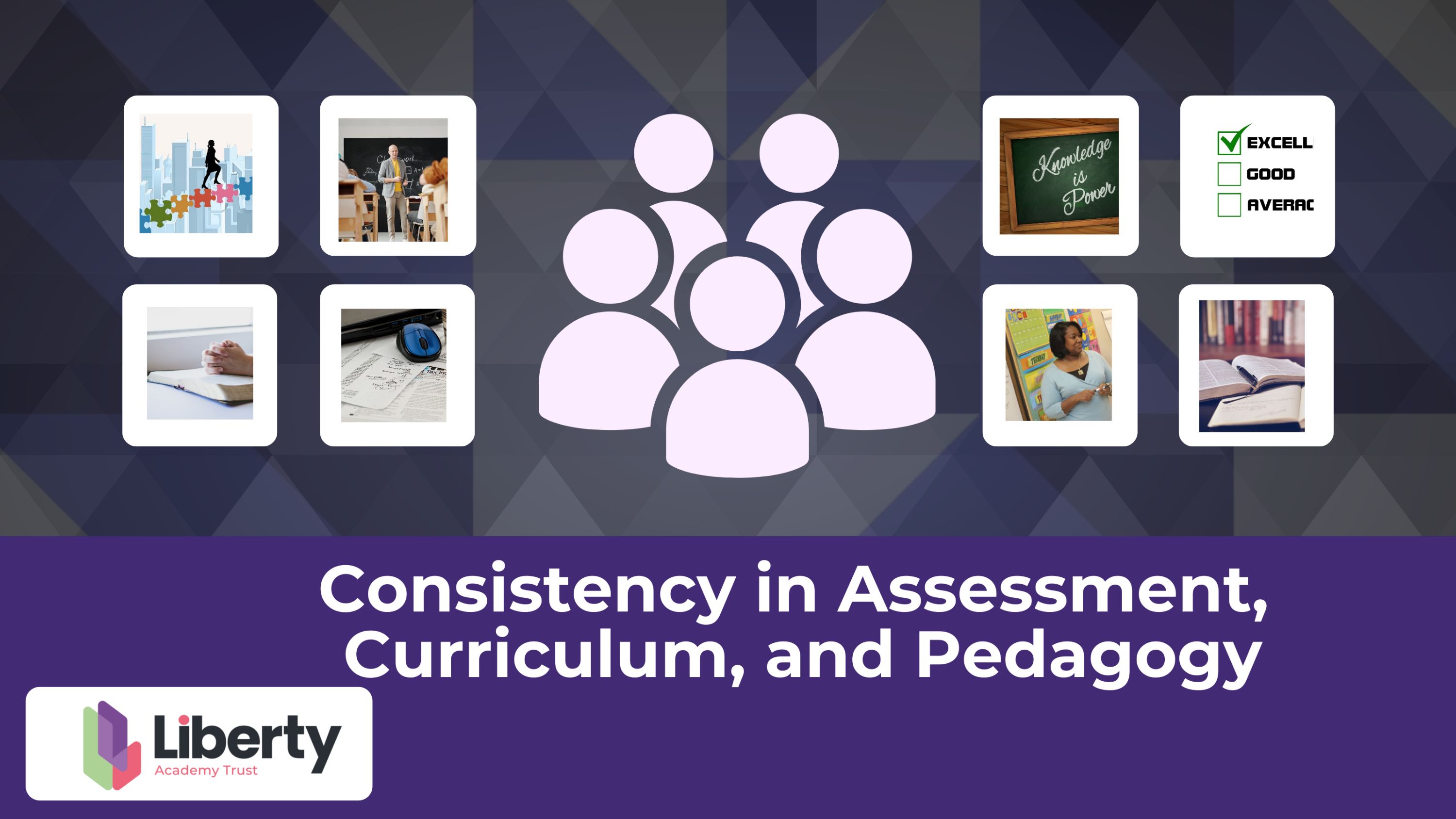
Clarity of Quality Assurance and Accountability
An effective Liberty academy strives for continued improvement, without fear or favour. This means that all colleagues understand the part they play in educating pupils in their school. Leaders at all levels have the confidence to confirm where individuals or groups of pupils are not doing as well as their peers and the drive to identify what they are doing about it and the timescales of improvement expected.
Clarity of quality assurance and accountability will be evidenced in the following ways:
- Openness and transparency in the sharing and forensic analysis of data, which is quality assured centrally, and triangulated with other academies in order to inform strengths and areas of development;
- Transparent and consistent approaches to appraisal and performance management for all staff who understand that accountability supports empowerment to be the best that we can be; and
- Performance targets which include a focus on the progress and attainment of all pupils, including those with multiple vulnerabilities, such as LAC, EAL, Socio-economic disadvantage, Gypsy, Roma and Traveller pupils, Asylum seekers, refugees and new migrants.
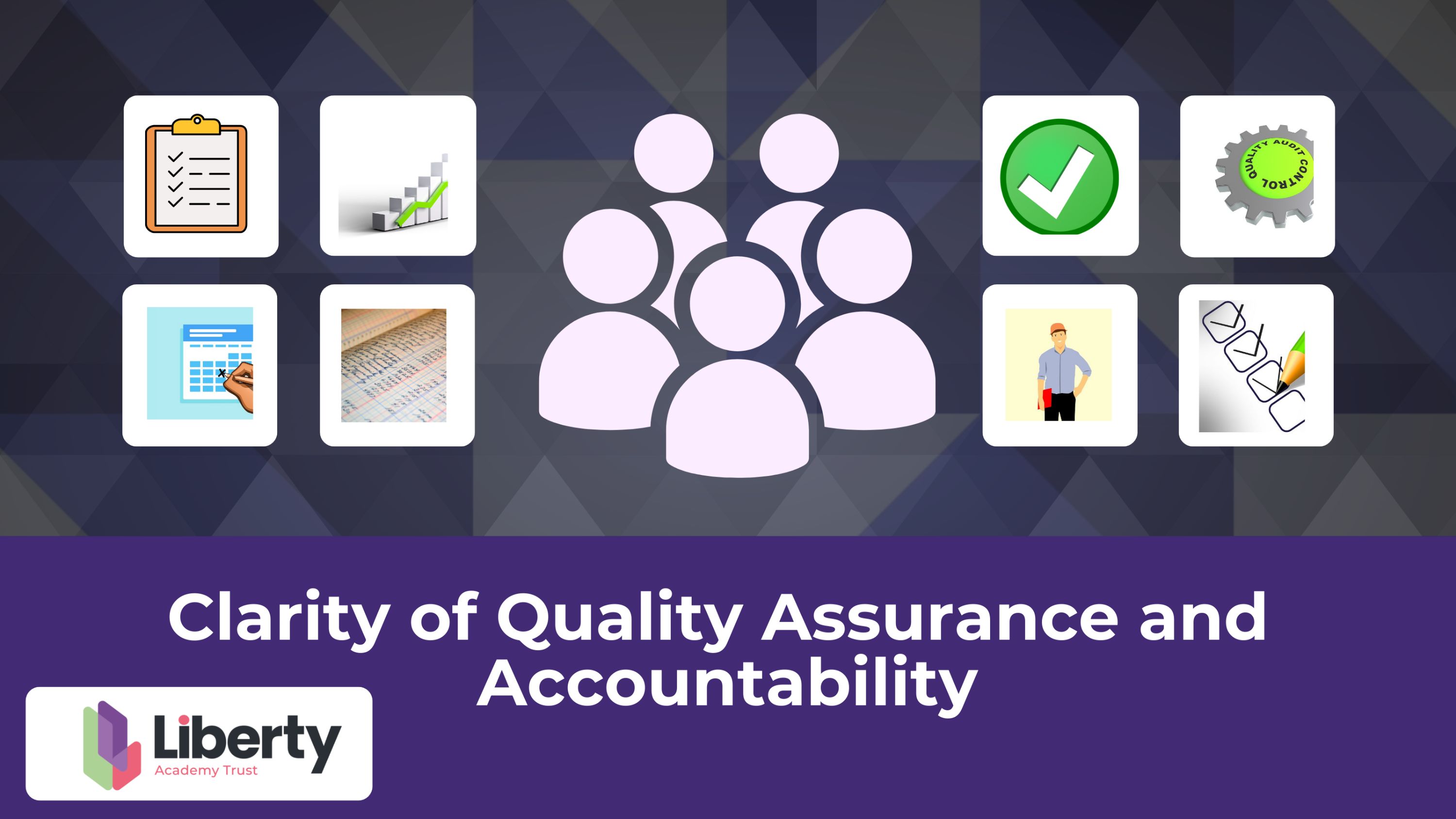
A Commitment to Developing as an Inclusive Learning Organisation
An effective Liberty academy embodies the mission to create a world that works for autistic children and young people, seeking first to understand their pupils and communities and championing the marginalised so that their future can be altered for the better. Pupils and families are not blamed for their poor behaviour or lack of achievement, but are offered support and strategies which allow them to see a better way of managing the challenges they face, as inclusive education seeks to transform practice in schools to promote inclusion rather than exclusion. (Council of Europe, 2015, p. 18).
A commitment to developing as an inclusive learning organisation will be evidenced in the following ways:
- An outward facing leadership team who actively seek opportunities for collaboration and partnership with other learning organisations both locally and nationally;
- Regular pupil voice surveys which show a positive reflection of the educational experience and where any negative reports are taken seriously and explored;
- Regular parent voice surveys which show a positive home-school relationship and where any negative reports are taken seriously, explored and fed back; and
- Active engagement and collaboration with the central Education team, understanding that support, guidance and recommendations are there to enhance the school.

